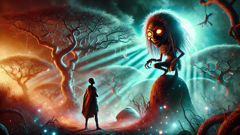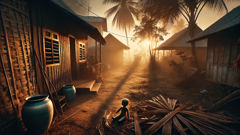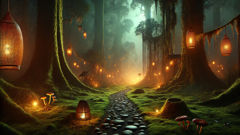Introduction
In the rolling hills and shadowed valleys of KwaZulu-Natal, where the early morning mist curls like ghostly fingers over the grass, the Zulu people have long whispered of creatures that slip between worlds. Among these, one name is spoken in hushed tones, especially when night descends and the wind sighs against thatched roofs—the Tokoloshe. Born from the heart of Zulu folklore, the Tokoloshe is no ordinary spirit. It’s a mischievous gremlin, small but powerful, said to appear when the world’s defenses are lowest and the line between the living and the spirit world is blurred. Parents warn their children to raise their beds on bricks at night, a curious custom meant to thwart a creature who can shrink, vanish, or slip beneath doorways. Some say the Tokoloshe’s hairy body is twisted and its eyes glow with cunning. Others insist it is invisible, a phantom only glimpsed from the corner of one’s eye—especially after it sips from a water gourd, vanishing from the mortal gaze. In this land, stories are lifeblood: they hold warnings, morals, and the wild magic of ancestors. The legend of the Tokoloshe isn’t merely a tale to frighten children; it’s a living reminder that mischief and malice can hide in unexpected places, and that courage may be found even in the smallest hearts. For when night falls and silence deepens, who dares face what stirs in the dark? This is the story of Nandi, a young girl whose bravery would echo for generations, and her confrontation with the most notorious spirit of all—the Tokoloshe.
The Unseen Mischief
Nandi’s village nestled on the edge of the Umgeni River, where the reeds swayed and the crocodiles basked in the sun. The days were warm and filled with laughter: children racing along dusty footpaths, women pounding mealies in stone mortars, men returning from the hunt with kudu slung over their shoulders. But as dusk approached, an ancient wariness took hold. Firelight flickered in the kraals, and the elders’ stories grew longer, their voices dropping to a murmur as shadows deepened.

On one such evening, Nandi sat with her grandmother, Gogo Mkhize, whose wrinkled face was lined with memories. "Never leave water beside your bed at night," Gogo warned, stirring the embers. "And always set your mat on bricks. If you don’t, the Tokoloshe will come for you."
Nandi listened, but her curiosity burned brighter than fear. She’d heard the stories—the tiny, hairy gremlin who could slip beneath doors, tangle hair, or sit on your chest until you could not breathe. Some said he was sent by jealous witches, others that he roamed free, playing cruel tricks for his own amusement. But Nandi had never seen him, and she wondered if the stories were just the wind’s invention.
One night, as the full moon floated above the veld, the village began to change. First, it was small things: precious beads vanishing from necklaces, milk gourds found spilled, the chickens refusing to roost. Then, children woke screaming from nightmares they could not explain. Livestock fell ill, and an icy dread crept into every home.
Gogo Mkhize was the first to suspect: "It is the Tokoloshe. He is among us."
The villagers gathered in fear. Some stacked their beds higher; others smeared protective ash around their doorways. But the mischief only grew. Old Mandla found his spear snapped in two. The sangoma’s (healer’s) hut was overturned, her charms scattered like seeds on the wind. At night, a strange giggling echoed near the riverbank, and footprints—small, three-toed—appeared in the mud, vanishing as soon as the sun rose.
Nandi felt the weight of fear pressing on her chest. She saw her father’s anxious face as he sharpened his spear, her mother’s tired eyes as she hung protective charms of twisted reed above the threshold. She could not sleep; every sound seemed a threat, every shadow a hiding place for the Tokoloshe.
Yet curiosity gnawed at her. One morning, she crept to the riverbank where the footprints were found. She knelt and traced them with her finger. A sudden chill danced up her spine. She looked up and saw nothing—only the reeds swaying, the water shimmering. But a low laugh bubbled from somewhere unseen. The hairs on her arms stood up. She remembered Gogo’s words: “He drinks water to vanish.”
Determined to protect her family, Nandi sought out the sangoma, Mama Jabu. The old healer, cloaked in beads and animal skins, listened gravely. "The Tokoloshe comes when there is envy, when peace is broken. He is drawn to mischief like a moth to flame."
“But how do I fight something I can’t see?” Nandi asked.
Mama Jabu pressed a pouch of herbs into Nandi’s palm. "The Tokoloshe fears bravery and laughter. He flees from those who stand tall in the face of fear. But first you must see him. Boil these herbs; breathe their smoke. Only then will your eyes open."
That night, with her heart pounding, Nandi brewed the herbs over a low flame. The smoke curled around her head, sharp and bitter. As she inhaled, her vision blurred, then sharpened with a strange clarity. The world shifted. Shadows seemed to flicker and writhe.
Suddenly, at the edge of her mat, a shape appeared: a tiny figure, no taller than a child’s knee, hairy and hunched, with long spindly fingers and bright, wicked eyes. It grinned, revealing sharp teeth. Nandi’s breath caught. The Tokoloshe had come.
He padded closer, reaching for the water gourd by her bed. Nandi’s courage surged. She grabbed the gourd and upended it, spilling the water onto the ground. The Tokoloshe hissed and shrank away, his form flickering like smoke. He leapt for the open window and vanished into the night, a cackle trailing behind him.
But Nandi knew this was only the beginning. The Tokoloshe was clever. He would not be banished so easily. She would need all her wits, and the strength of her ancestors, to defend her home from his tricks.
The Hunt for the Vanishing Trickster
Days passed, but peace did not return. The Tokoloshe’s mischief escalated: gourds exploded in the night, pots cracked for no reason, and dreams grew troubled and restless. The elders gathered again, and this time their voices were edged with desperation. Old women clutched their amulets; young men patrolled the fields with clubs and burning torches, yet the Tokoloshe slipped through every trap like mist through fingers.

Nandi felt a heavy burden on her young shoulders. She watched her parents’ fear deepen, their laughter fading from the hearth. That night, she resolved to do what no one else dared—she would hunt the Tokoloshe in his own world, where mortal eyes could not follow. She returned to Mama Jabu, asking for guidance.
The sangoma led Nandi into her hut, where dried herbs hung from the rafters and bones rattled in gourds. "To enter the spirit world is not a thing for children," Mama Jabu warned. "But sometimes, a child’s courage is sharper than a man’s spear." She mixed a bitter brew and traced symbols on Nandi’s brow. "Drink this, and you will walk between worlds. But remember: the Tokoloshe is clever. He will try to trick you, to frighten you with your own fears."
Nandi drank, feeling her mind spin as sleep dragged her down. She awoke in a world both familiar and strange. The village glowed with an unearthly light, every shadow pulsing with secret life. Spirits flitted among the trees—some kind, some twisted. Nandi felt small but determined. She clutched her pouch of herbs and stepped forward.
The Tokoloshe found her before she found him. He appeared atop a termite mound, his eyes like coals. "You are brave, little girl," he rasped. "But bravery is not enough. Do you think you can chase me from this place?"
Nandi stood her ground. "Why do you torment us? Leave my people in peace!"
The Tokoloshe’s grin widened. "It is not I who came first. It is jealousy, anger, greed—these call me forth. I am only the shadow they cast."
Nandi’s resolve wavered. Was it true? Was the Tokoloshe only here because something in her village had drawn him? She remembered squabbles over land, old feuds rekindled by a drought, envy over a neighbor’s good harvest. The Tokoloshe fed on these things as surely as he drank water.
He darted toward her, teeth bared. Nandi fumbled for her pouch, tossing the herbs into his path. Smoke billowed; the Tokoloshe shrieked and stumbled. Spirits gathered to watch, some laughing, others whispering warnings.
"What do you fear, little one?" the Tokoloshe taunted, shifting shape—now a snarling dog, now a cackling monkey, now the shadow of her own mother weeping.
Nandi’s heart thundered in her chest. She remembered Gogo’s words: He flees from those who stand tall in the face of fear. So she stood tall. "I fear nothing but losing my family’s love. I will not give you that power!"
The Tokoloshe howled, twisting in agony. He tried to reach for water to vanish again, but Nandi seized the gourd first, smashing it against the earth. "You cannot hide from courage!"
A great wind swept through the spirit world, carrying away the smoke and shadows. The Tokoloshe shrank, his fur falling away in clumps, his eyes dimming. He staggered to his knees. "Clever child," he wheezed. "But I am not so easily destroyed. I will return, for there is always a crack for shadows to slip through."
With a final shudder, he dissolved into mist. The spirits bowed to Nandi as she felt herself drawn back to waking.
She awoke in Mama Jabu’s hut, the dawn light pale and soft. The village was quiet. No laughter yet, but no screams either. Nandi stepped outside, greeted by wary smiles. Her parents hugged her, tears in their eyes. The sangoma announced that the Tokoloshe had been banished—for now. But she reminded everyone that peace was fragile: "Where there is kindness and unity, shadows cannot linger."
Nandi’s bravery became legend. The villagers mended their feuds, shared their harvests, and watched over one another. At night, they still raised their beds on bricks and swept their thresholds clean. But now they did so not just out of fear, but out of respect for the unseen world—and for the courage found even in a child’s heart.
Conclusion
The legend of the Tokoloshe endures in every Zulu village where tales are told by firelight and children peek nervously under their beds. It is a story woven from fear and hope, reminding all who hear it that the greatest monsters are often born from discord and despair, yet can be chased away by the smallest acts of courage and unity. Nandi’s triumph didn’t banish the Tokoloshe forever—after all, mischief and malice find new cracks with each passing generation—but her bravery lit a beacon for others to follow. In honoring her courage, the villagers learned to guard not only their homes but their hearts from the shadows that lurk at the edges of community and kinship. Even today, when the wind howls through the reeds or strange footprints appear in the mud, the story of the Tokoloshe serves as both warning and promise: that fear can be faced, and darkness turned away, if only one dares to stand tall.













